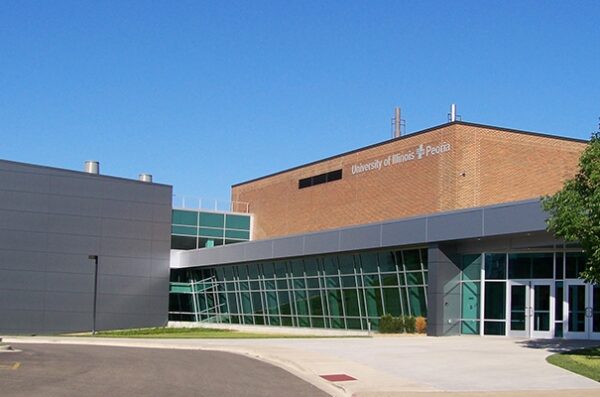Academic Support

The College of Medicine provides strategic, holistic academic advising for all students. Through collaborative partnerships with academic success team members, students will receive guidance and strategies as they navigate the curriculum and prepare for NBME board examinations.
Our Philosophy: We believe that a college-wide intertwined, holistic advising system is key for student success. Academic support at UI COM involves key partnerships among the student, staff, and faculty. This is a collaborative process available to all students that involves connecting students with advising, peer support, counseling, and other campus resources.
Academic Support at UI COM Heading link
Connect with Academic Support: Staff who are in Academic Advising roles are the primary point of contact for connecting students with academic support staff and resources. Students can also connect with support staff and resources through the College of Medicine Urban Health Program (COM UHP) and the Hispanic Center of Excellence (HCOE).
Academic Learning Specialists: We have experts in medical student learning on every campus. Our Academic Learning Specialists help students analyze performance using a strengths-based approach for learning in medical school. They assist students with academic skills, time management, test taking strategies, and study planning.
Peer Education Program: Students have the opportunity to connect with peer student leaders who serve in the role of peer education. Peer Educators offer group tutoring, and in some cases, individualized support.
Academic Support Resources: UI COM is committed to student success and provides resources such as Q Banks, exam vouchers, and study guides.
-
Intro
Staff who provide Academic Advising services assist students in understanding policies, procedures, and connect students to other resources as needed. Academic Advisors are the first point of contact for students for connecting with academic support at the College of Medicine.
Table
The Academic Advisor Will: The Student is Expected To: Foster an environment of academic professionalism. Convey expectations for assignments, deadlines, and professional behavior. Conform to course and clerkship norms of academic professionalism. Adhere to deadlines, assignment requirements, and professional behaviors. Articulate COM policies, procedures, and graduation requirements. Follow the College of Medicine policies and procedures regarding academic requirements for graduation. Respond promptly to student requests for meetings. Respond promptly to meeting requests with academic advisors. Be prepared for meetings, by reviewing your information before scheduled appointments. Be prepared to discuss educational goals, academic progress, and other academic needs. Meet with you regularly. Listen carefully to your individual concerns and interests. Be proactive in academic and personal development. Seek help with questions, concerns, and ideas. Help to create a personalized learning plan, or map, that outlines requirements in each phase of your education at the College. Follow the plan, report any issues and concerns that arise. Help you to recognize your individual areas for improvement in knowledge, skills, and attitudes as early as possible in your medical education and to connect with academic support services and resources. Maintain consistent communication regarding academic progress and performance. Engage in self-reflection opportunities. Discuss individualized academic concerns with you based on unsatisfactory academic progress (e.g., final exam grades) and counsel you about possible implications as well as possible remedies. Accept responsibility for your academic success and develop a working relationship your academic advisor throughout the medical school curriculum. Connect you to needed personal resources through referrals and support services. Maintain appointments with outside resources, respond to outreach. -
Intro
Academic Learning Specialists assist students with learning strategies, academic skills, study planning, and test preparation. Students who wish to meet with an Academic Learning Specialist should contact their Academic Advisor.
Table
The Academic Learning Specialist Will: The Student is Expected To: Help you manage your workload through the application of learning strategies. Try out learning strategies, implement learning strategies. Help you to identify your academic strengths through a strengths-based approach to learning. Openness to assessing individual learning strengths that promote a growth-mindset. Reflect upon strengths to implement self-regulated learning. Work with you to set short and long-term goals for academic success. Identify and track short and long-term goals, articulating plan of success. Acknowledge success. Implement feedback from Block course learning plans, following-through on learning plans. Help you construct strategic, individualized study plans for Block courses, Step 1, Step 2 CK, and Shelf Exams. Maintain updates with progress and update study plans. Share any changes to the study plan. Be open to changes with study plan. Communicate frequently and pro-actively with your Learning Specialist. Connect you with Peer Education and additional support resources. Follow-through with referrals. Complete SMART Goals with Peer Education. Prepare for appointments in advance, and attend appointments. Deliver group workshops on learning strategies such as test taking and time management. Attend sessions for academic support and enrichment of study skills. Help you identify a plan to manage your academic support resources. Ask questions and seek advice about the management of resources. Use COM resources such as Peer Education. -
Peer Educators
Peer Educators are student leaders who assist students with content mastery through large group sessions, small group sessions, and individual tutoring. The Peer Education Program is open to all COM students, and is a collaborative resource implemented by the Office of Student Affairs (OSA) and the College of Medicine Urban Health Program (COM UHP). Peer Educators model learning strategies to empower students in their studies and mastery of the material. Students are encouraged to talk with an OSA or COM UHP staff member if they are interested in connecting with Peer Education at their campus.
Students can access group review sessions and office hours/drop-in times Here
Peer educators are trained by academic support staff and members of the COM community on the following evidence-based methods:
- Learning theory
- Academic strategies
- Communication skills
- Student well-being
- Learning preferences
Objectives for Peer Education
Peer Educators provide assistance with
- Block Content Review
- Step 1
- Support with Phase 1 & Phase 2
- Individual tutoring by referral
Table
Your Peer Educator Will: The Student is Expected To: Provide content support for students with SMART Goals approach. Complete SMART Goals. Engage in self-reflection about the learning process Models evidence-based academic study and test taking strategies. Ask questions, and notify the peer educator if uncertain. Be a partner in the learning process. Maintain contact with faculty and staff to stay current on curricular update. Respond promptly for appointment scheduling. Facilitate the learning process for Phase 1 and Phase 2 of the curriculum.. Provide feedback about their experience with Peer Education Lead group review and individual tutoring sessions. Come prepared for the tutoring session (SMART Goals, pre-work, formulating questions) -
Academic Support Resources
The College of Medicine is committed to student success. All students at the college receive the following exam preparation and self-assessment resources. Academic support resources are distributed at appropriate intervals throughout the curriculum:
- First Aid for the USMLE Step 1 Study Guide
- UWorld 6 Month Subscription for USMLE Step 1
- UWorld 1 Year Subscription for USMLE Step 2 CK
- CBSSA Exam Voucher for USMLE Step 1
- CCSSA Voucher for USMLE Step 2 CK
Osmosis:
All students are provided with access to Osmosis. Osmosis is a web- and mobile application that makes medical education more efficient. Content from the Block courses is uploaded to the Osmosis system by UI COM coordinators or other staff/students, depending on campus. The system scans the text on these documents and provides relevant educational content like videos, USMLE-style practice questions, and references to First Aid to use while studying. Osmosis can be used to help prepare for NBME exams, Step 1, Shelf exams, and Step 2CK.Additional academic support resources can be found on the UI COM All Student Resources Blackboard site. This site contains resources for students in all phases of their education:
- Study plan guidelines
- Study tips
- Time management tips
- Overview of learning preferences
We encourage students to use these resources to supplement their work with Academic Advisors, Academic Learning Specialists, and Peer Educators.
-
Academic success team partners
Academic success team partners include, and are not limited to:
-
Student Health and Wellness Resources
Chicago Campus
Peoria Campus
Rockford Campus
-
Intro
The following reading list is recommended by the academic support staff. Literature on learning theory, memory, supporting a growth-mindset, and positive psychology. Electronic versions of the readings are available through UIC Library, or through the UIC Library Links on Google Scholar*.
- Make it Stick: The Science of Successful Learning. Brown, Roediger, & McDaniel (2014)
- Human Agency in Social Cognitive Theory. Bandura (1989). American Psychologist, 44.
- Self Determination Theory and the Facilitation of Intrinsic Motivation, Social Development, and Well-Being. Ryan & Deci (2000). American Psychologist, 55.
*For Google Scholar, select the menu bars at the top left corner of the screen, select ‘settings’, select ‘library links’. Enter ‘University of Illinois at Chicago’ for institutional access. You must be logged in through your common ID for access.
Geoff Thames, PhD Heading link

Geoff Thames, PhD
Executive Director for Student Academic Support and Achievement
Dr. Geoff Thames is the Executive Director for Student Academic Support and Achievement at the University of Illinois College of Medicine. In this position, Geoff coordinates college-wide academic support for UI COM students. Geoff has experience with instructional design, program assessment, learning theory, peer-to-peer academic support, and coaching. Student success drives everything that he does as an educator, and he believes in empowering students through a strengths-based approach to learning.
Contact Information
Email: gthames@uic.edu
Phone: 312-355-5939


